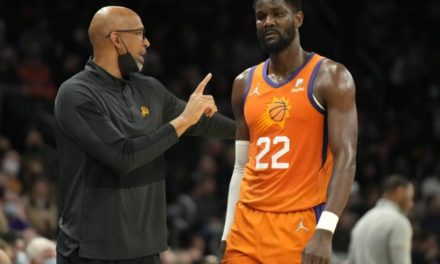Simone Biles celebrates her Olympic bronze medal in the individual balance beam final on Tuesday. Photo: GETTY IMAGES
I love shiny Olympic gold medals as much as the next person, but there’s something else happening in world sport that excites me even more. It’s women athletes finding their voice.
The mantra: “I’m just grateful to have been given the opportunity to play the sport I love”, which echoed across the sporting landscape with depressing regularity is now slowly fading and is being replaced by demands for equality and respect.
Of course, there have always been women prepared to put a rocket up the glacial pace of change.
Kathrine Switzer concealed her sex to compete in the Boston Marathon in 1967, and in doing so, smashed stereotypes about women’s bodies and paved the way for women to enter the race as actual women in 1972. The following year, Billie Jean King founded the Women’s Tennis Association (WTA) and led the movement for women players to earn equal prize money in tournaments that featured both women and men.
The 1970s also gave us the Yale University Women’s Rowing Team. After training, the team would wait on the bus that it shared with the men’s team, wet and cold, while the men showered. Their conditions were a violation of Title IX.
So, in 1976, 19 college athletes from the team marched into the athletic administration office and in a perfectly synchronised move, peeled off their tops to reveal “Title IX” written across their bare bodies. Within two weeks, the female rowers “magically” had new locker rooms, and their action became a rallying cry that spread to women on other campuses.
Since 2015, the US Women’s soccer team has become a global voice for equality in sport through on-field protests, interviews and social media campaigns. The players sued US Soccer in March 2019, arguing they had been subjected to years of unequal treatment and compensation. The fight continues.
We owe all these women a lot. Acts of courage create change. And change is about more than pay and conditions.
What an athlete wears is political and gets to the crux of the relationship between sport and femininity. No matter how strong, skilful and talented a woman athlete is, she’s also under pressure to conform to society’s preferred model of femininity.
In the 19th century, women who played sport had to cover up with corsets and full-length skirts to match the times. Today, less is more for women in sport.
For decades, female gymnasts have worn bikini-cut leotards. So it came as quite a surprise when the German women turned up wearing full-length leotards at the Tokyo Olympics – in response to what the country’s sport federation DTB has called “sexualisation in gymnastics”.
PLEASE HELP US CONTINUE TO THRIVE BY BECOMING AN OFFICIAL FOOTYOLOGY PATRON. JUST CLICK THIS LINK.
These are the first Summer Games since Larry Nassar, a former USA Gymnastics national team doctor, was sent to prison for up to 175 years for sexually abusing hundreds of gymnasts. At his sentencing, athletes — some of them Olympians — described how the sport’s culture supported the abuse and objectification of young women and girls.
Sexploitation, whether it’s clothing, language or inane polls about hottest sportswomen, all perpetuate the same two lazy stereotypes: women exist primarily for their beauty, and men are so thick that all they care about are beautiful women.
Girls and women shouldn’t have to choose between sport and “femininity”. They should be able to express who they are though their sport and they should be able to choose what they wear. They should feel confident and comfortable. Their bodies. Their decision.
Just days before the Games began, the Norwegian women’s beach handball team refused to play in bikini bottoms during the Euro 2021 tournament, choosing skin-tight shorts instead.
The European Handball Federation fined the team for “improper clothing”. Female athletes must wear bikini bottoms “with a close fit and cut on an upward angle toward the top of the leg” and a maximum side width of 10 centimetres, according to International Handball Federation regulations.
Men wear singlet tops and shorts.
Members of Australia’s women’s beach handball team supported their Norwegian sisters (as did popstar Pink who, in a gold medal performance, offered to pay the fine).
Women athletes are also speaking up and shifting attitudes about mental health.
The decision by Simone Biles, the most decorated gymnast in history, to withdraw from the team final to focus on her mental health and wellbeing was powerful and courageous. The backlash was sadly predictable – she’s ‘weak’, she’s a ‘quitter’.
Biles has won 32 Olympic and World Championship medals; one of them while passing a kidney stone. She’s added so much difficulty to her routines over the years, judges have struggled to rate her extraordinary skills. And she was sexually abused by Nassar.
There is nothing weak about Simone Biles, who indeed made a triumphant return to centre stage in the individual balance beam final on Tuesday, winning bronze. The only weakness on show here came from the people who bully successful women as a coping mechanism for their own inadequacies.
Biles, Australian basketballer Liz Cambage and tennis champion Naomi Osaka are destigmatising mental health by saying “it’s ok to not be ok” – and for this, they should be applauded.
These strong women are changing sport and they’re changing it for the better. They’re part of a much bigger movement happening in Australia and globally post the #metoo movement.
Women are taking control of their own bodies, and no amount of gold can top that.












